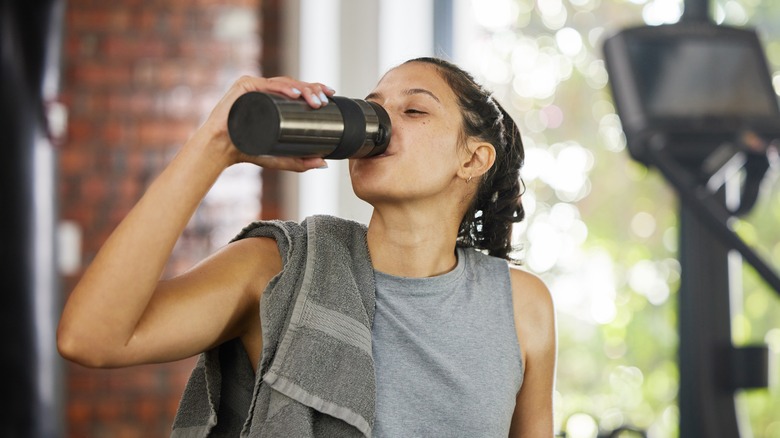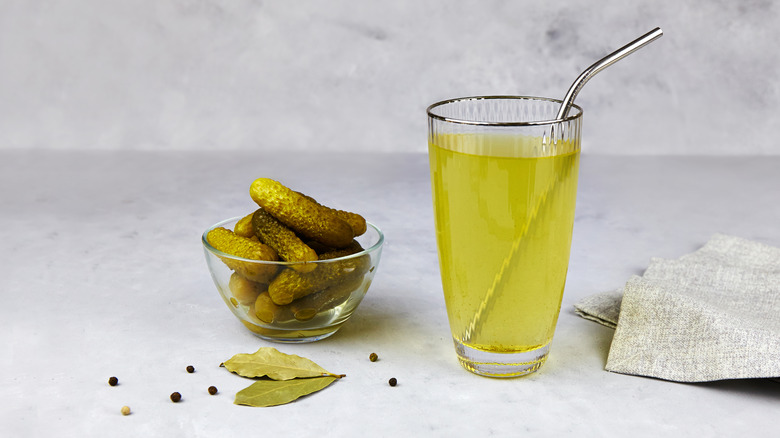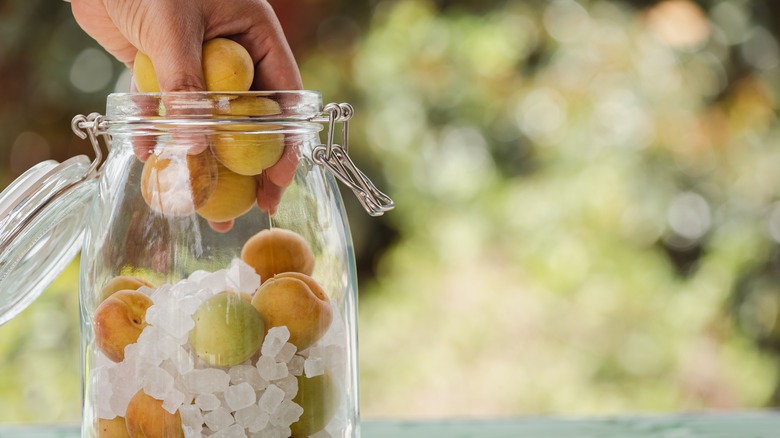The Unexpected Juice You Should Drink After A Workout
Few sensations are as intense as thirst after a prolonged workout. Your dry throat and sweat-drenched clothes are clear signs of water loss, but that's not the only thing you're losing — coming out with your sweat are minerals known as electrolytes. Many turn to sports drinks for replenishing both water and electrolytes, but some of those drinks are surprisingly unhealthy. Plus, there's a mix that has very similar components, only it's potentially a lot more affordable: pickle juice.
Like popular sports drinks, pickle juice often contains a mix of sugar, salt, and vitamins. A study published by the Medicine & Science in Sports & Exercise suggests that it may help reduce the duration of muscle cramps. The time difference was only up to 49 seconds, but when you're exhausted and in pain from a grueling workout session, that can be a noticeable difference! While more research is needed to confirm its benefits, some report it can quench thirst quickly.
Beyond hydration and cramp relief, pickle juice boasts other perks. It typically contains zero fat and can carry antioxidants from fruits or vegetables (though remember that it's also high in sodium). If it's fermented, it also may come with gut-healthy bacteria. Best of all, leftover pickle juice doesn't cost you an extra dime and can be easily customized to suit your taste.
Incorporating pickle juice into your routine
Depending on the type of vegetable or fruit you use, pickle juice can have a range of flavors, and some are more drinkable than others. If you've ever wandered the streets of Vietnam on a summer day, you may have seen street vendors selling refreshing drinks made of pickled lime juice over ice, often known as chanh muối.
Regardless of the flavors, it's normal for beginners to find pickle juice a bit intense. To ease into it, start by adding a small amount to your water post-workout and gradually increase the serving size. If you find it too sharp at first, add a pinch of sugar, then gradually reduce the sweetener as your taste buds adjust.
You can also freeze pickle juice into ice cubes to add to your water or mix it with other juices. Pickle lemonade is a great start, but other citrus juices like lime or calamansi (or milder non-citrus options such as watermelon or pear) also pair very well with pickle juice.
A word of caution
While pickle juice can be hydrating, don't forget that it often contains a high amount of sodium, meaning it's probably not a great choice for anyone who is watching their sodium intake. Likewise, all that salt means you shouldn't be guzzling pickle juice every day. If you're making pickles at home, be mindful of how much sodium you're adding to the brine and work out a safe amount of juice to take per day. If you're buying pickles from the store, check the ingredients list. Apart from salt, some brands tend to add sugars and flavorings that you might not want in your drink.
Pickle juice also contains vinegar, which is acidic and can have varying effects your digestion, such as inducing acid reflux, though this depends on the individual. According to anecdotal reports, pickle juice may relieve acid reflux symptoms for some, but worsen them for others. If pickle juice doesn't sit well with you, don't worry — there are still many other ways to use it! In the end, no matter your health condition, pickle juice should never replace water as your go-to drink and should be just an occasional and small-scale addition.


